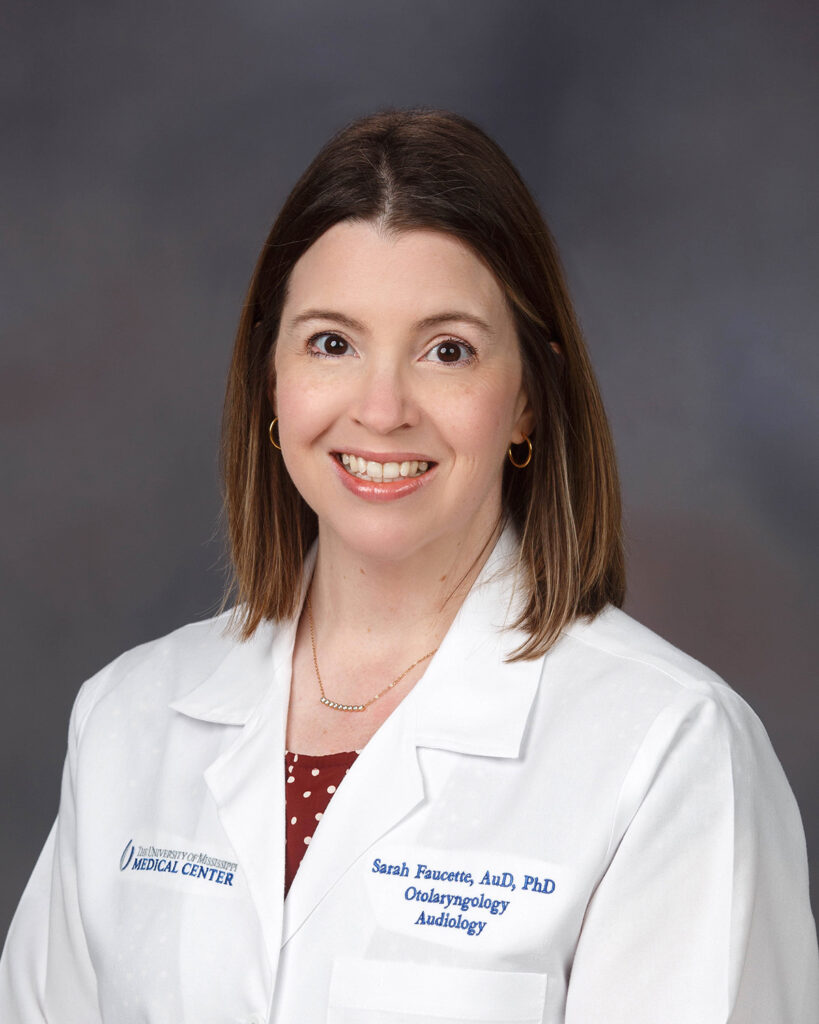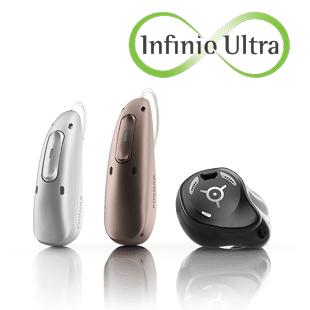
Social benefits of hearing interventions for older adults: Insights from the ACHIEVE Study
The ACHIEVE team recently published findings from their large, long-term clinical trial suggesting that hearing interventions may support social well-being in older adults by helping preserve social connections and may also reduce perceptions of loneliness.
The 2023 US Surgeon General advisory reported high rates of social isolation among older adults.1 Moreover, the report notes that social isolation is associated with increased morbidity, mortality, and poor healthcare utilization. Promoting, augmenting, and maintaining social well-being could mitigate this impact and audiologists could play a key role.
Social isolation, loneliness and hearing loss
Social isolation is the objective way we measure social connections (i.e. asking a person, “How many close friends do you have (meaning people that you feel at ease with, can talk to about private matters, and call on for help)?”). 2
Loneliness is the subjective way we measure social perceptions (i.e. asking a person, “How often do you feel isolated from others?”).3
More than a quarter of older adults say they have little or no contact with others, and a third report feeling lonely.4 Experts have linked isolation to hearing loss, which can interfere with communication and relationship building.5-7 Addressing these social and sensory experiences is vital in this patient population which is commonly seen in audiology practices. New evidence has emerged on how a hearing intervention with hearing aids could have a positive influence on social engagement.8
These first-of-their-kind results from a large and long-term clinical trial suggest that hearing interventions, including the provision of devices by a qualified hearing care professional, should be part of a comprehensive approach to mitigate potential negative impacts of social isolation and loneliness among older adults with untreated hearing loss.
This recommendation is especially important given how common these issues are.
The ACHIEVE Study, to-date
The ACHIEVE Study (Aging and Cognitive Health Evaluation in Elders) was a large clinical trial investigating the impact of hearing intervention versus health education on 3-year cognitive decline.9,10
The study found that a best-practice hearing intervention may slow cognitive decline, specifically for individuals with more risk factors9,11 and that additional secondary analyses have reported various other health benefits of hearing intervention.12-15
The ongoing long-term follow-up study aims to further explore these findings.
How the study looked at social isolation and loneliness
The ACHIEVE Study examined social isolation and loneliness as secondary outcomes. Results from this portion of the study were recently released.8
To measure social networks, the researchers used the Cohen Social Network Index2 which considers:
- The number of people in a person’s social network.
- Diversity of interactions (e.g., spouse, close friend, neighbor).
- Depth of engagement in various social network domains.
Loneliness was measured using the UCLA Loneliness Scale3. These measures were collected at baseline and then every 6 months.
What did the study find?
Compared to the health education control group, the hearing intervention group:
- Retained, on average, one additional person in their social network over three years
- Experienced less shrinkage in the diversity and embeddedness of their social interactions (suggesting a possible protective effect of hearing intervention on social isolation over 3 years)
- Reported a small but statistical decrease in perception of loneliness
These effects were maintained even after adjusting for COVID-19 lockdowns that may have impacted social activity.
Limitations of the study
While these findings are promising, some important limitations should be kept in mind.
Participants and study staff were not blinded to the intervention assignment because they could not be feasibly masked due to the nature of the treatment.
Generalizability is also constrained, and further research is needed for a broader understanding of how hearing interventions impact social factors and loneliness among diverse patient populations, in various settings, and alongside other treatments. Lastly, the study did not account for varying levels of social isolation or loneliness at baseline.
Clinical recommendations: Bringing these findings into day-to-day practice
With these findings, we want to ensure we are keeping a few things in mind when bringing these results into clinic. Consider the following:
Adopt a person-centered approach to hearing care for older adults. This involves a comprehensive evaluation, goal setting, involving family or friends, and understanding individual needs for successful outcomes.16-17
Regular check-ins and consistent device usage enhance success, with adjustments and support provided as needed. Reinforce benefits of hearing aids and assistive technologies while setting realistic expectations.
Encourage patients to share how their hearing affects their social interactions. Occasionally, these discussions may reveal challenges like loneliness, anxiety, or depression that extend beyond our expertise, warranting referral to multidisciplinary care teams.
Interpret findings with context. While these findings provide valuable insights into the impact of hearing intervention on social outcomes for older adults, it is essential to note these results reflect a specific study population and design which may limit generalizability.
Prioritize ethical, evidence-based practices. Fit devices based on individual goals and needs and use validated methods like real-ear verification and questionnaires.
Concluding thoughts
Connection is important for overall health and well-being, and communication is key to building and maintaining relationships. Addressing untreated hearing loss may positively impact social outcomes and the experience of loneliness and social isolation. While the ACHIEVE Study shows statistically significant changes in social networks and loneliness, their clinical relevance is uncertain.
Hearing interventions are safe and can enhance social connections among older adults. These findings reinforce the importance of advocating for hearing healthcare and treatment access. Effective communication, expertise, and a focus on positive outcomes are vital for us as hearing care professionals to promote the social well-being of our patients through best practices.
We invite you to find this article and other evidence supporting hearing intervention on the Phonak Evidence page.
Source of Funding:
The Aging and Cognitive Health Evaluation in Elders (ACHIEVE) Study is supported by the National Institute on Aging (NIA) grant R01AG055426, with magnetic brain resonance examination funded by NIA R01AG060502 and with previous pilot study support NIAR34AG046548 and the Eleanor Schwartz Charitable Foundation, in collaboration with the Atherosclerosis Risk in Communities (ARIC) Study, supported by National Heart, Lung and Blood Institute contracts (HHSN268201100005C, HHSN268201100006C, HHSN268201100007C,HHSN268201100008C, HHSN268201100009C, HHSN268201100010C,HHSN268201100011C, and HHSN268201100012C). Neurocognitive data in ARIC is collected by U01 2U01HL096812, 2U01HL096814, 2U01HL096899, 2U01HL096902, 2U01HL096917 from the NIH (NHLBI, NINDS, NIA and NIDCD), and with previous brain MRI examinations funded by R01HL70825 from the NHLBI. Hearing aids, hearing assistive technologies, and related materials used in the ACHIEVE Study were provided at no cost to the researchers or the participants from Sonova/Phonak LLC. The funders of the study, nor the sponsoring manufacturer, had no role in study design, data collection, data analysis, data interpretation, or writing of the report.
Acknowledgments: Members of the ACHIEVE Collaborative Research Group are listed at
https://www.achievestudy.org/about/our-team. The authors thank the staff and participants of the ACHIEVE and ARIC studies for their important contributions.
References:
- Office of the Surgeon General (OSG). (2023). Our Epidemic of Loneliness and Isolation: The U.S. Surgeon General’s Advisory on the Healing Effects of Social Connection and Community. US Department of Health and Human Services. http://www.ncbi.nlm.nih.gov/books/NBK595227/
- Cohen, S., Doyle, W. J., Skoner, D. P., Rabin, B. S., & Gwaltney, J. M. (1997). Social ties and susceptibility to the common cold. JAMA, 277(24), 1940–1944.
- Russell, D., Peplau, L. A., & Cutrona, C. E. (1980). The revised UCLA Loneliness Scale: Concurrent and discriminant validity evidence. Journal of Personality and Social Psychology, 39(3), 472–480. https://doi.org/10.1037//0022-3514.39.3.472
- CDC. (2025, February 3). Health Effects of Social Isolation and Loneliness. Social. Connection. https://www.cdc.gov/social-connectedness/risk-factors/index.html
- Weinstein, B. E., & Ventry, I. M. (1982). Hearing impairment and social isolation in the elderly. Journal of Speech and Hearing Research, 25(4), 593–599. https://doi.org/10.1044/jshr.2504.593
- Huang, A. R., Reed, N. S., Deal, J. A., Arnold, M., Burgard, S., Chisolm, T., Couper, D., Glynn, N. W., Gmelin, T., Goman, A. M., Gravens-Mueller, L., Hayden, K. M., Mitchell, C., Pankow, J. S., Pike, J. R., Sanchez, V., Schrack, J. A., Coresh, J., Lin, F. R., & ACHIEVE Collaborative Research Group. (2024). Loneliness and Social Network Characteristics Among Older Adults With Hearing Loss in the ACHIEVE Study. The Journals of Gerontology. Series A, Biological Sciences and Medical Sciences, 79(2), glad196. https://doi.org/10.1093/gerona/glad196
- Huang, A. R., Reed, N. S., Deal, J. A., Arnold, M., Burgard, S., Chisolm, T., Couper, D., Glynn, N. W., Gmelin, T., Goman, A. M., Gravens-Mueller, L., Hayden, K. M., Mitchell, C., Pankow, J. S., Pike, J. R., Schrack, J. A., Sanchez, V., Coresh, J., & Lin, F. R. (2024). Depression and Health-Related Quality of Life Among Older Adults with Hearing Loss in the ACHIEVE Study. Journal of Applied Gerontology : The Official Journal of the Southern Gerontological Society, 43(5), 550–561. https://doi.org/10.1177/07334648231212291
- Reed, N. S., Chen, J., Huang, A. R., Pike, J. R., Arnold, M., Burgard, S., Chen, Z., Chisolm, T., Couper, D., Cudjoe, T. K. M., Deal, J. A., Goman, A. M., Glynn, N. W., Gmelin, T., Gravens-Mueller, L., Hayden, K. M., Mitchell, C. M., Mosley, T., Oh, E. S., Pankow, J. S., … ACHIEVE Collaborative Research Group (2025). Hearing Intervention, Social Isolation, and Loneliness: A Secondary Analysis of the ACHIEVE Randomized Clinical Trial. JAMA internal medicine, e251140. Advance online publication. https://doi.org/10.1001/jamainternmed.2025.1140
- Lin, F. R., Pike, J. R., Albert, M. S., Arnold, M., Burgard, S., Chisolm, T., Couper, D., Deal, J. A., Goman, A. M., Glynn, N. W., Gmelin, T., Gravens-Mueller, L., Hayden, K. M., Huang, A. R., Knopman, D., Mitchell, C. M., Mosley, T., Pankow, J. S., Reed, N. S., Sanchez, V., … ACHIEVE Collaborative Research Group (2023). Hearing intervention versus health education control to reduce cognitive decline in older adults with hearing loss in the USA (ACHIEVE): a multicentre, randomised controlled trial. Lancet (London, England), 402(10404), 786–797. https://doi.org/10.1016/S0140-6736(23)01406-X
- Deal, J. A., Goman, A. M., Albert, M. S., Arnold, M. L., Burgard, S., Chisolm, T., Couper, D., Glynn, N. W., Gmelin, T., Hayden, K. M., Mosley, T., Pankow, J. S., Reed, N., Sanchez, V. A., Richey Sharrett, A., Thomas, S. D., Coresh, J., & Lin, F. R. (2018). Hearing treatment for reducing cognitive decline: Design and methods of the Aging and Cognitive Health Evaluation in Elders randomized controlled trial. Alzheimer’s & dementia (New York, N. Y.), 4, 499–507. https://doi.org/10.1016/j.trci.2018.08.007
- Pike, J. R., Huang, A. R., Reed, N. S., Arnold, M., Chisolm, T., Couper, D., Deal, J. A., Glynn, N. W., Goman, A. M., Hayden, K. M., Mitchell, C. M., Pankow, J. S., Sanchez, V., Sullivan, K. J., Tan, N. S., Coresh, J., Lin, F. R., & ACHIEVE Collaborative Research Group (2025). Cognitive benefits of hearing intervention vary by risk of cognitive decline: A secondary analysis of the ACHIEVE trial. Alzheimer’s & dementia : the journal of the Alzheimer’s Association, 21(5), e70156. https://doi.org/10.1002/alz.70156
- Bessen, S. Y., Zhang, W., Huang, A. R., Arnold, M., Burgard, S., Chisolm, T. H., Couper, D., Deal, J. A., Faucette, S. P., Goman, A. M., Glynn, N. W., Gmelin, T., Gravens-Mueller, L., Hayden, K. M., Mitchell, C. M., Pankow, J. S., Pike, J. R., Reed, N. S., Sanchez, V. A., … ACHIEVE Collaborative Research Group. (2024). Effect of Hearing Intervention Versus Health Education Control on Fatigue: A Secondary Analysis of the ACHIEVE Study. The Journals of Gerontology. Series A, Biological Sciences and Medical Sciences, 79(11), glae193. https://doi.org/10.1093/gerona/glae193
- Huang, A. R., Morales, E. G., Arnold, M. L., Burgard, S., Couper, D., Deal, J. A., Glynn, N. W., Gmelin, T., Goman, A. M., Gravens-Mueller, L., Hayden, K. M., Mitchell, C. M., Pankow, J. S., Pike, J. R., Reed, N. S., Sanchez, V. A., Schrack, J. A., Sullivan, K. J., Coresh, J., Lin, F. R., … ACHIEVE Collaborative Research Group (2024). A Hearing Intervention and Health-Related Quality of Life in Older Adults: A Secondary Analysis of the ACHIEVE Randomized Clinical Trial. JAMA network open, 7(11), e2446591. https://doi.org/10.1001/jamanetworkopen.2024.46591
- Sanchez, V. A., Arnold, M. L., Garcia Morales, E. E., Reed, N. S., Faucette, S., Burgard, S., Calloway, H. N., Coresh, J., Deal, J. A., Goman, A. M., Gravens-Mueller, L., Hayden, K. M., Huang, A. R., Mitchell, C. M., Mosley, T. H., Jr, Pankow, J. S., Pike, J. R., Schrack, J. A., Sherry, L., Weycker, J. M., … ACHIEVE Collaborative Study (2024). Effect of hearing intervention on communicative function: A secondary analysis of the ACHIEVE randomized controlled trial. Journal of the American Geriatrics Society, 72(12), 3784–3799. https://doi.org/10.1111/jgs.19185
- Goman, A. M., Tan, N., Pike, J. R., Bessen, S. Y., Chen, Z. S., Huang, A. R., Arnold, M. L., Burgard, S., Chisolm, T. H., Couper, D., Deal, J. A., Glynn, N. W., Gmelin, T., Gravens-Mueller, L., Hayden, K. M., Martinez-Amezcua, P., Mitchell, C. M., Pankow, J. S., Reed, N. S., Sanchez, V. A., … ACHIEVE Collaborative Research Group (2025). Effects of hearing intervention on falls in older adults: findings from a secondary analysis of the ACHIEVE randomised controlled trial. The Lancet. Public health, 10(6), e492–e502. https://doi.org/10.1016/S2468-2667(25)00088-X
- Sanchez, V. A., Arnold, M. L., Reed, N. S., Oree, P. H., Matthews, C. R., Clock Eddins, A., Lin, F. R., & Chisolm, T. H. (2020). The Hearing Intervention for the Aging and Cognitive Health Evaluation in Elders Randomized Control Trial: Manualization and Feasibility Study. Ear and Hearing, 41(5), 1333–1348. https://doi.org/10.1097/AUD.0000000000000858
- Sanchez, V. A., Arnold, M. L., Betz, J. F., Reed, N. S., Faucette, S., Anderson, E., Burgard, S., Coresh, J., Deal, J. A., Eddins, A. C., Goman, A. M., Glynn, N. W., Gravens-Mueller, L., Hampton, J., Hayden, K. M., Huang, A. R., Liou, K., Mitchell, C. M., Mosley, T. H., Jr, Neil, H. N., … ACHIEVE Collaborative Study (2024). Description of the Baseline Audiologic Characteristics of the Participants Enrolled in the Aging and Cognitive Health Evaluation in Elders Study. American journal of audiology, 33(1), 1–17. Advance online publication. https://doi.org/10.1044/2023_AJA-23-00066
Author info:
Jacqueline Weycker, AuD
Dr. Weycker is a research audiologist at the University of Minnesota in the School of Public Health. She is the lead study audiologist at the Minneapolis field site for the ACHIEVE study.

Nicholas Reed, AuD, PhD
Dr. Reed is an Associate Professor in the Departments of Otolaryngology-Head & Neck Surgery and Population Health and in the NYU Langone Health Optimal Aging Institute. His research focuses hearing aid technology and use in the United States, the association between hearing loss and cognitive decline, social function, and health care outcomes/interactions, as well as whether interventions targeting hearing loss can mitigate these associations.
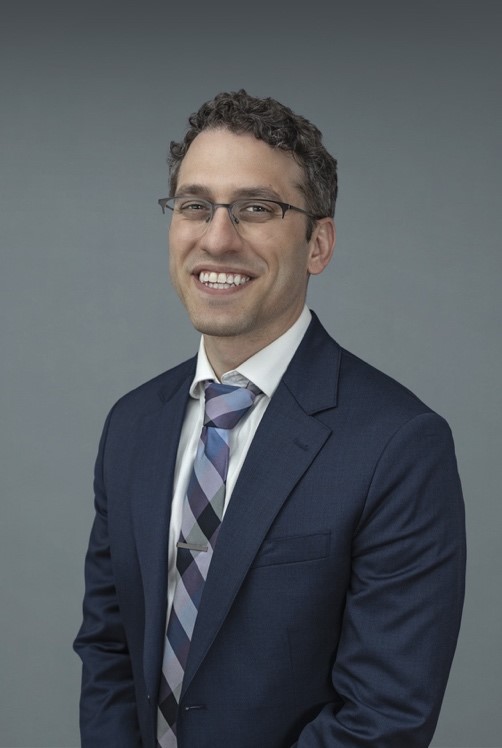
Victoria Sanchez, AuD, PhD
Dr. Sanchez is a clinician scientist at the University of South Florida where she provides patient care, teaches and mentors trainees, and conducts research in the Auditory Rehabilitation & Clinical Trials Laboratory.
LinkedIn: www.linkedin.com/in/victoria-sanchez-aud-phd-60009119a
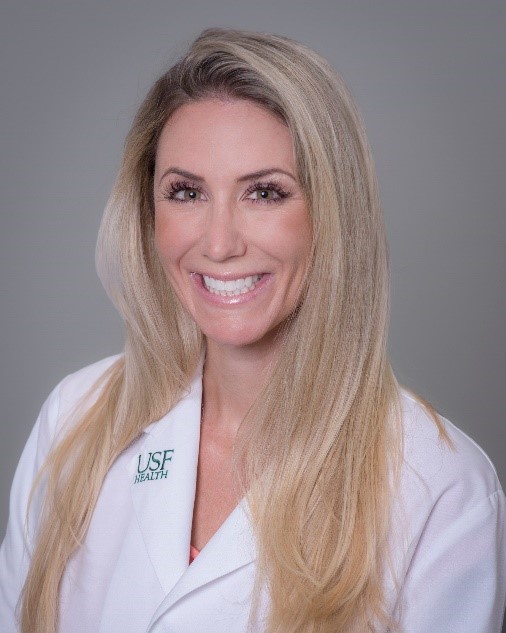
Haley Calloway, AuD
Dr. Calloway is an Assistant Professor in the Department of Otolaryngology at the University of South Florida. She is a clinical audiologist and specializes in diagnosing and treating hearing disorders for adult and pediatric populations. She is also a Research Audiologist in the Auditory Rehabilitation & Clinical Trials Laboratory.
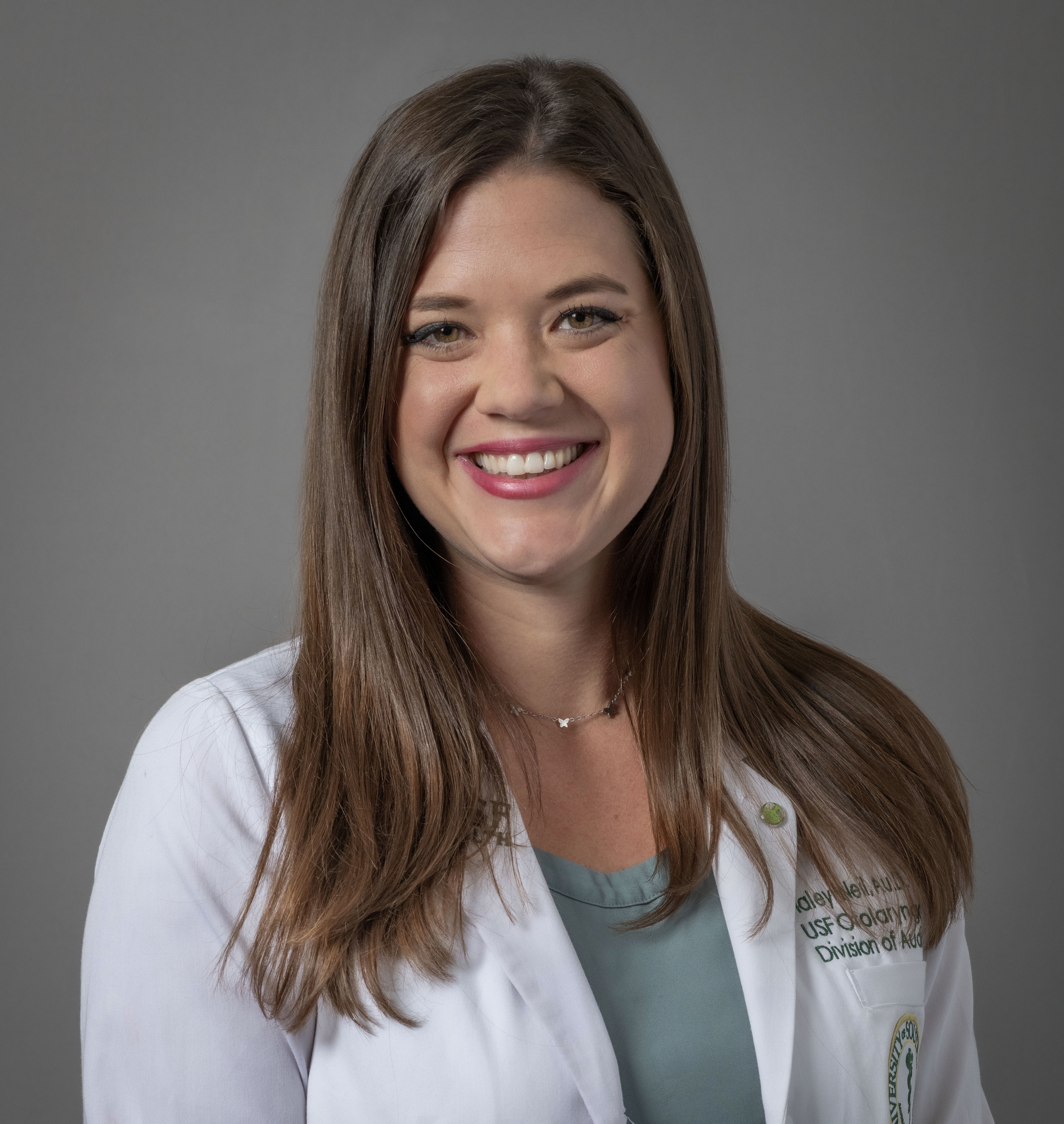
Sarah Faucette, AuD, PhD
Dr. Faucette is an Associate Professor at the University of Mississippi Medical Center. She serves at ACHIEVE’s Jackson site as the lead research audiologist. Faucette also teaches Audiological Management in the UMMC AuD program and works clinically in adult diagnostics and treatment.
